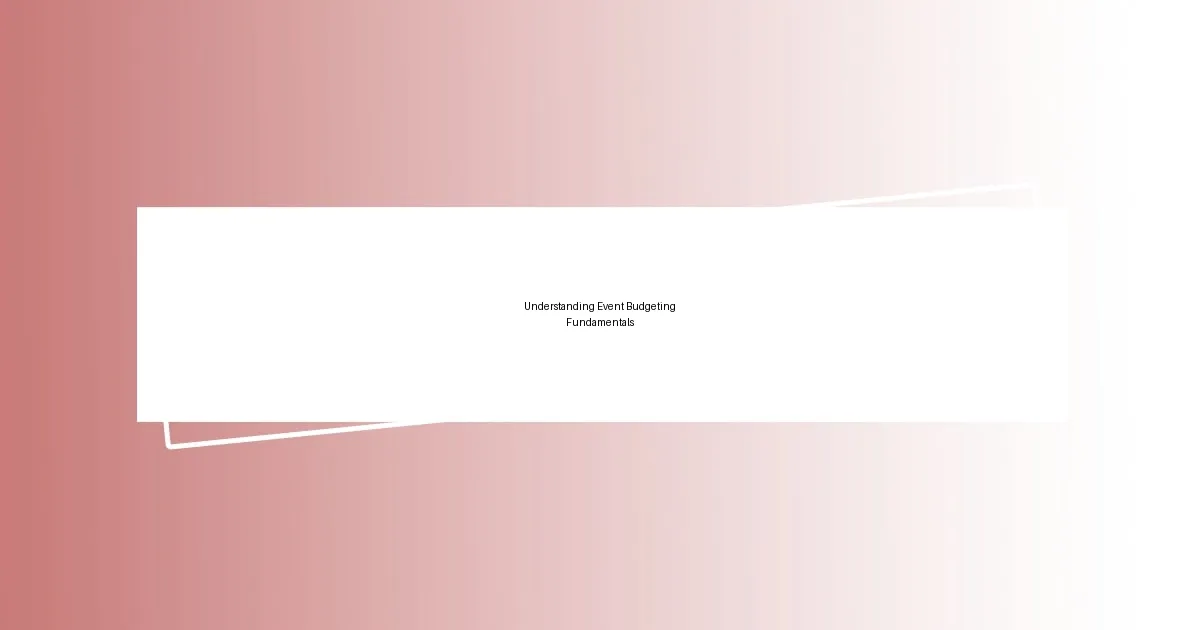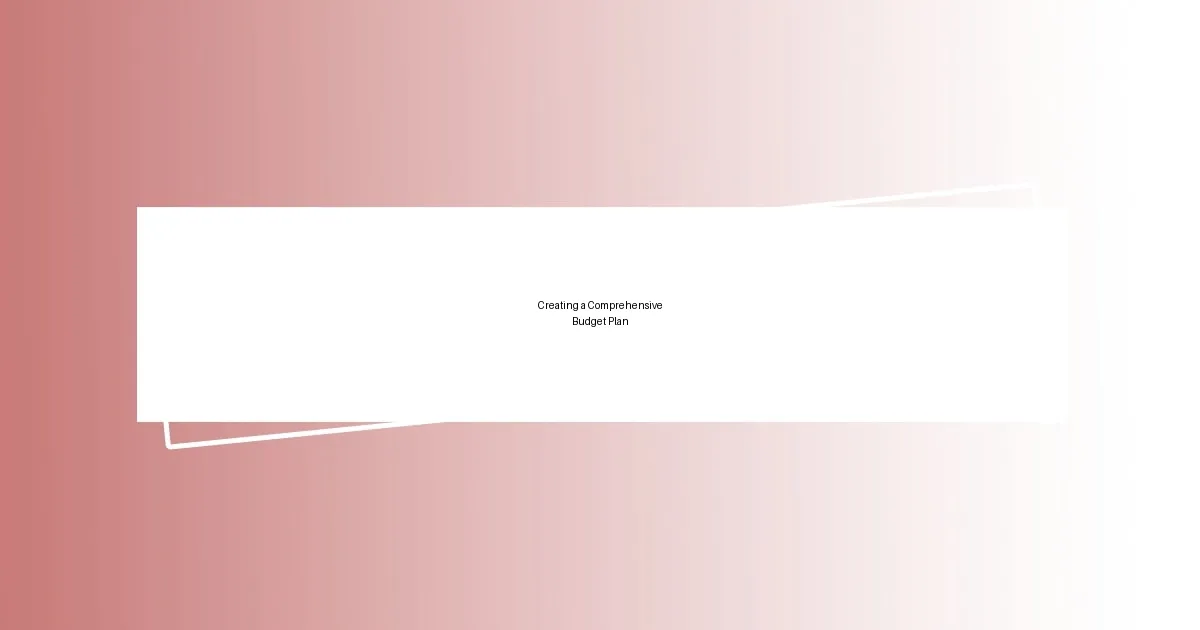Key takeaways:
- Creating a detailed budget and categorizing expenses helps maintain control and clarity during event planning.
- Setting clear financial goals establishes accountability and motivates the team to adhere to the budget.
- Implementing a comprehensive budget plan with flexibility allows for effective management of unexpected costs.
- Post-event financial evaluations provide insights for future improvements and empower better resource allocation.

Understanding Event Budgeting Fundamentals
When it comes to event budgeting, understanding the fundamentals is crucial. I vividly remember my first event that nearly spiraled out of control financially. I realized then that a detailed budget could be the difference between success and chaos. How many times have you walked into an event and felt overwhelmed by costs? If I had only taken the time to categorize my expenses from the start, I could’ve avoided that panic.
Creating a budget means identifying all potential costs involved. From venue rentals to catering and decor, every aspect can add up quickly. Personally, I always use a spreadsheet with categories that allow me to track each dimension. This method not only helps visualize where my money is going but also serves as a reality check on my overall vision. Isn’t it easier when you can see in front of you exactly what you have to work with?
I often think of budgeting as a roadmap for my events. It provides a clear path but also highlights areas where I need flexibility. I’ve learned that setting aside a percentage for unexpected costs can be a lifesaver. One time, we had to shift locations last minute due to bad weather—the additional costs hit hard, but thanks to my contingency fund, I managed to keep everything running smoothly. Wouldn’t you agree that anticipating these scenarios makes for a more enjoyable planning experience?

Setting Clear Financial Goals
Setting clear financial goals is a cornerstone of successful event budgeting. I’ve always believed that without defined objectives, budgeting can feel like shooting in the dark. For instance, during one of my early events, I had a vague notion of spending limits, but it wasn’t until I set concrete financial goals that I truly gained control over my expenses. Establishing specific targets not only helps in tracking spending but also motivates the team to stick to the plan.
Here are some tips to set those clear financial goals:
- Define Your Overall Budget: Decide a total expenditure that aligns with your event’s purpose and expected revenue.
- Break It Down: Create specific categories within the budget, such as venue, catering, and marketing.
- Set Priorities: Identify which elements are non-negotiable and which can be adjusted if needed.
- Engage Stakeholders: Solicit input from team members and stakeholders to ensure all perspectives are considered.
- Review Regularly: Regularly check in on your budget versus actual spending to stay on track.
When I embarked on my journey of setting clear financial goals for an important corporate event, I vividly remember gathering my team to brainstorm. The energy in the room shifted as we transformed abstract ideas into tangible numbers. It was during these discussions that I saw the direct impact of clarity on our commitment and excitement. Each team member’s involvement made the financial goals feel attainable, and when we successfully executed the event within our budget, it reinforced the importance of having a strategized approach. Isn’t that feeling of shared success something we all strive for in our events?

Creating a Comprehensive Budget Plan
When creating a comprehensive budget plan, I always emphasize the importance of detail. A good budget isn’t just about numbers; it tells a story about the event’s vision. For instance, while working on a charity gala, I included every conceivable expense from décor to entertainment in one detailed document. Initially, I was overwhelmed, thinking, “How can I manage all this?” But as I organized and prioritized my entries, I realized it was empowering. Seeing everything laid out gave me clarity and confidence, allowing me to allocate resources effectively and even make cost-saving adjustments along the way.
One approach that I find incredibly effective is to use a comparison table to track various service providers. Having a side-by-side view helps me understand which vendor can provide the best value without compromising quality. For example, when I was sourcing catering for a corporate event, I compared multiple menus and costs in a table format. This exercise not only simplified my decision-making process but also sparked discussions about what aspects were most important to the stakeholders. Have you ever felt a sense of relief after organizing information visually? It can transform the way you perceive your options.
Additionally, embracing a flexible mindset is crucial in budget planning. Once, I encountered unexpected repairs in the venue just days before an event. My contingency fund allowed me to handle these surprises without losing sleep or breaking the bank. I believe this adaptability is what distinguishes a good plan from a great one. Anticipating the unforeseen and adjusting accordingly reinforces my belief that a comprehensive budget is not just a static spreadsheet; it evolves with the event itself. Are you ready to embrace that dynamic nature of budgeting?
| Key Aspect | Example |
|---|---|
| Detailed Categorization | Break down all potential costs into specific categories (venue, catering, etc.) |
| Vendor Comparison | Use a side-by-side comparison table for service providers to identify the best value |
| Contingency Fund | Set aside a percentage for unexpected expenses, ensuring flexibility |

Tracking Expenses Effectively
Effective expense tracking is paramount to maintaining control over an event budget. Whenever I wrap up an event, I make it a practice to log every single expense in real-time. This habit not only helps me catch discrepancies early but also alleviates the headache of reconciling receipts later. Have you ever found yourself scrambling for those last-minute invoices? I certainly have, and I learned that keeping everything organized from day one is a total game changer.
One effective method I’ve utilized is employing budgeting software that allows me to track expenses alongside the budget in real-time. During a recent festival I orchestrated, this approach enabled me to see how each dollar was allocated and spent as the event unfolded. It became my go-to tool for adjusting my spending on-the-fly and realizing when I could splurge a bit more on something special, like the entertainment. The ability to pivot quickly based on my current standing brought a thrilling sense of control—doesn’t it feel good to adjust your sails in response to the winds?
Moreover, I also make it a point to review expense categories regularly. For instance, while planning a conference last year, I noticed that our marketing expenses were creeping higher than anticipated. By diving back into the details, I uncovered opportunities to cut costs without sacrificing reach, such as leveraging social media more heavily instead of traditional ad spends. Keeping a close eye on each category not only enhances my decision-making but also empowers me with insights I might otherwise miss—don’t you agree that knowing where your money goes brings peace of mind?

Managing Unexpected Costs
Managing unexpected costs is an inevitable part of event planning, and I’ve learned to approach this with a mix of preparation and adaptability. I vividly remember planning a large outdoor festival when an unexpected rainstorm threatened our timeline. To manage costs effectively, I quickly consulted my contingency fund and allocated additional resources for renting tents. Have you ever faced a sudden issue that forced you to pivot? In my case, this quick thinking saved not only the event but also helped maintain the morale of my team and attendees.
One strategy that has served me well involves maintaining strong relationships with vendors. After all, they can be a lifeline in emergencies. When a key supplier for a corporate retreat unexpectedly raised prices, I reached out to my network and found a backup vendor capable of stepping in at the last minute. That conversation turned into a valuable partnership and highlighted for me the importance of having trustworthy contacts. Doesn’t it feel reassuring to know you have a safety net when the unexpected strikes?
Regularly reassessing your budget throughout the planning process is another critical practice. While organizing a charity auction, I started tracking every small expense meticulously. This approach alerted me when certain categories, like decorations, began to inflate unexpectedly. By addressing these fluctuations early, I could reallocate funds intelligently and keep the event on track. Have you noticed how small changes can lead to major impacts? I think that staying vigilant makes a world of difference and ensures that surprises, when they do happen, are manageable rather than overwhelming.

Evaluating Post-Event Financial Performance
Evaluating post-event financial performance is crucial for understanding the overall success of your budget management. After every event, I sit down with my financial reports and reflect on what worked and what didn’t. Recently, after a corporate gala, I realized that, while ticket sales exceeded our projections, we significantly overspent on catering. It was a wake-up call that prompted me to ask myself: How can we balance attendee experience with budget constraints more effectively next time?
As I sifted through the numbers, I found that analyzing each line item not only highlighted areas for improvement but also celebrated our successes. During another event, we came in under budget because of innovative partnerships with local vendors. That achievement wasn’t just gratifying; it reinforced the importance of community ties in event planning. Have you ever had a moment where the numbers tell a deeper story? In my experience, these financial evaluations can reveal opportunities for growth and better resource allocation in future events.
I also share these insights with my team during our debrief sessions. Transparency about financial outcomes fosters a culture of accountability and innovation. I remember one of my first events where we reviewed the financial performance together; this not only helped us brainstorm creative solutions for sticking points but also sparked new ideas for future ventures. Ultimately, I’ve learned that evaluating post-event financial performance is less about critiquing ourselves and more about empowering our next steps. How often do you reflect on your financial outcomes to shape your future strategies? To me, it’s a vital step in evolving as an event planner.














